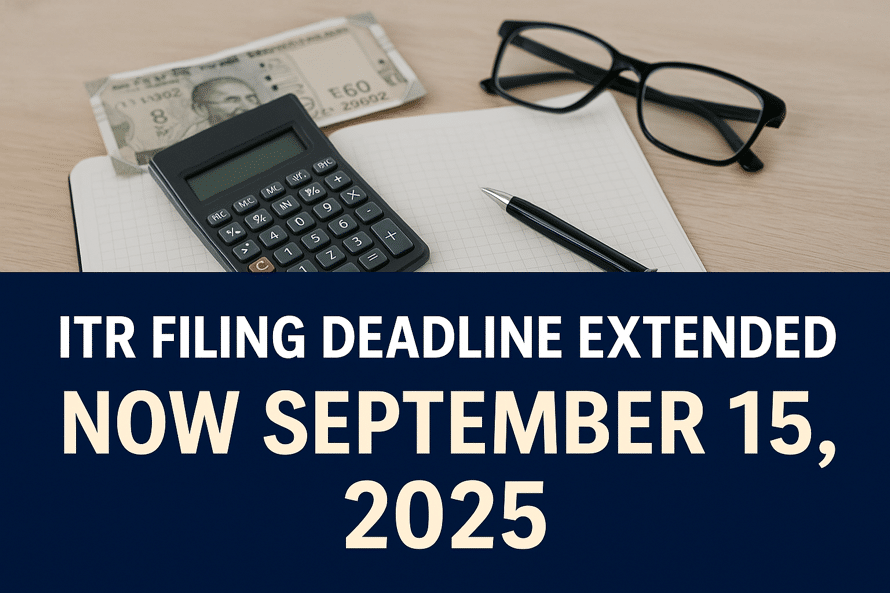ITR Filing Deadline for AY 2025–26 Extended: What Taxpayers Need to Know

If you’re planning to file your Income Tax Return (ITR) for the Assessment Year 2025–26, there’s good news: the government has extended the deadline for many taxpayers. But that’s not the full story. Knowing the key dates, categories, penalties, and filing tips can help you avoid late fees, interest, and tax hassles down the line.
Updated ITR Filing Deadline: What’s Changed?
The Central Board of Direct Taxes (CBDT) has extended the ITR filing deadline for most individuals and non-audit taxpayers to September 15, 2025. This is a 45-day extension from the original due date of July 31.
But don’t let this extra time lull you into inaction. The deadline to pay self-assessment tax is still July 31, 2025. If you delay that payment, you’ll incur 1% monthly interest under Section 234A — even if you file on time later.
Who Has to File ITR and By When?
Different taxpayer types have different deadlines. Here’s a quick breakdown:
| Taxpayer Type | ITR Due Date |
|---|---|
| Individuals (non-audit) | 15 Sept 2025 |
| Businesses requiring audit | 31 Oct 2025 |
| Entities with international/specified domestic transactions | 30 Nov 2025 |
| Belated or revised returns | 31 Dec 2025 |
| Updated returns (ITR-U) | Up to 31 Mar 2030 |
Why the Deadline Was Extended
The extension isn’t random — several real issues led to it:
- Major changes in ITR forms required time for implementation.
- Technical delays: Online and offline filing utilities weren’t ready on time.
- TDS credit visibility: Taxpayers couldn’t see accurate TDS credits until June.
- Feedback from stakeholders: There were genuine concerns about the shortened compliance window.
Consequences of Late Filing
Filing after the deadline? Be ready to pay.
1. Late Filing Fees (Section 234F)
- ₹5,000 if your income is over ₹5 lakh.
- ₹1,000 if your income is ₹5 lakh or less.
- ₹10,000 if filed after Dec 31, 2025.
2. Penal Interest (Section 234A)
- Interest of 1% per month applies if self-assessment tax isn’t paid by July 31.
3. Other Drawbacks
- You can’t carry forward business or capital losses.
- You might miss deductions or delay your refund.
- Late filing increases the risk of tax scrutiny.
Pro Tips for Filing Smoothly
To avoid errors, penalties, or delays:
- Start early: Avoid the last-minute rush.
- Pick the correct ITR form: Choosing the wrong one means your return may be invalid.
- Reconcile with Form 26AS & AIS: Match your income, TDS, and financial data.
- Double-check personal and bank details: Refunds get delayed if info doesn’t match.
- Understand your tax regime: The new regime is now the default. Choose wisely, especially if you run a business.
- E-verify your return: It’s required to complete the process.
The Status of ITR Utilities as of July 2025
- ITR-1, 2, and 4 are available for both online and offline filing.
- ITR-3 Excel utility is live, but the JSON (online) utility is pending.
- ITR-5, 6, and 7 — needed by trusts, firms, and companies — are still not released.
Because of these delays, many experts believe further extensions might be announced, especially for audit and corporate taxpayers.
Helpful Resources
FAQs
Q. Can I file after September 15, 2025?
Yes, but you’ll face a late fee. The final date for belated or revised returns is December 31, 2025. You can file an updated return until March 31, 2030.
Q. What if I forget to pay self-assessment tax by July 31?
You’ll be charged 1% monthly interest under Section 234A — even if you file before Sept 15.
Q. What is the ITR-U form?
It allows taxpayers to update their return (even if they didn’t file one) up to 48 months after the end of the assessment year — but with hefty additional taxes.
Key Takeaways
- Deadline for individuals: Sept 15, 2025
- Deadline to pay self-tax: July 31, 2025
- Late filing gets expensive: Fees, interest, and more
- Filing early helps: More time, fewer errors, faster refunds
- Stay updated: Keep checking for possible extensions
Disclaimer
The stocks mentioned in this article are not recommendations. Please conduct your own research and due diligence before investing. Investment in securities market are subject to market risks, read all the related documents carefully before investing. Please read the Risk Disclosure documents carefully before investing in Equity Shares, Derivatives, Mutual fund, and/or other instruments traded on the Stock Exchanges. As investments are subject to market risks and price fluctuation risk, there is no assurance or guarantee that the investment objectives shall be achieved. Lemonn (Formerly known as NU Investors Technologies Pvt. Ltd) do not guarantee any assured returns on any investments. Past performance of securities/instruments is not indicative of their future performance.







